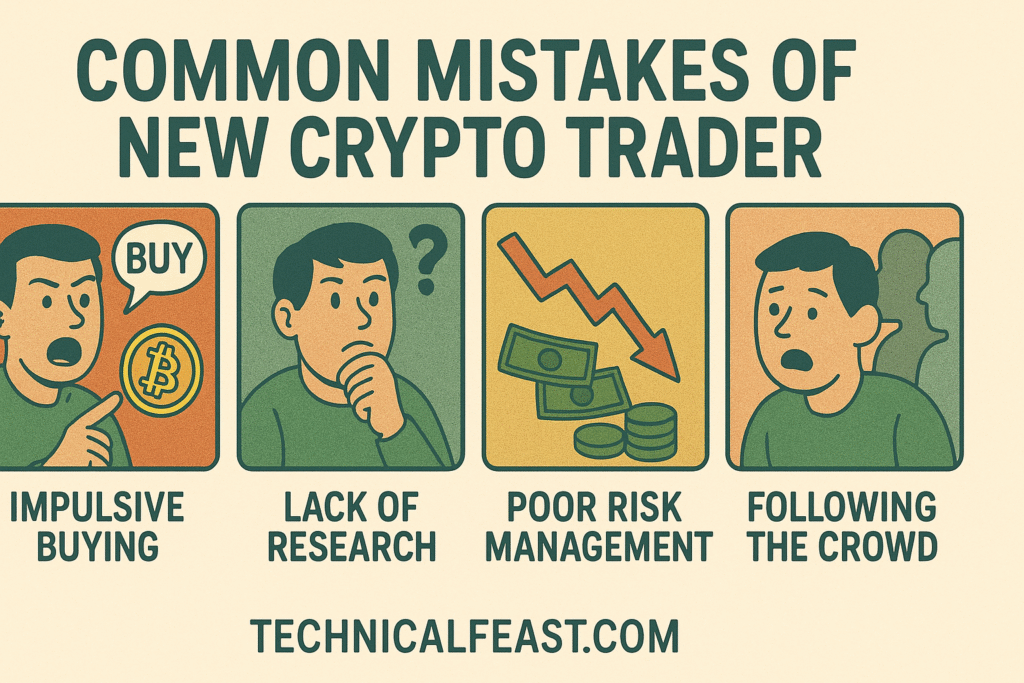Table of Contents
Cryptocurrency is everywhere — friends are talking about it, news stories highlight wild gains, and social media is filled with “to the moon!” hype. It’s impossible not to feel curious or even excited to try trading crypto. I remember a friend, let’s call him Alex, who dove headfirst into trading after seeing an influencer claim to double his investment overnight. Alex started small but soon found himself staring in disbelief as his account balance shrunk instead of growing. It wasn’t just bad luck — the harsh truth is that most new crypto traders lose money in the early days (if not forever). For many, it feels like a modern-day gold rush; for others, it’s a high-stakes gamble. One viral tweet even showed someone turning a few hundred dollars into $50,000 on an obscure altcoin — but Alex didn’t see the countless traders losing money in silence. That statistic isn’t just a scare tactic—it’s a sign that the game is hard. In this article, we’ll explore why crypto traders lose money so often and how you can avoid becoming a statistic yourself.
The crypto market exploded with promise. A few years back, it seemed like everyone knew someone who got rich from Bitcoin or other cryptocurrencies. Headlines screamed about people quitting their jobs after huge crypto wins, and almost anyone could buy crypto with a tap on their phone. This created a fear of missing out (FOMO). New crypto traders lose money in part because they jump in too late, chasing rising prices. The excitement is infectious, but it often blinds newcomers to the risks. Often, they buy in at the peak of a bubble only to watch their investment tumble when the market corrects. For instance, during the 2017 crypto boom, Bitcoin shot from around $5,000 to nearly $20,000 in months — then plunged just as dramatically.
However, cryptocurrency is not magic money. It’s important to remember that for every winner, there are many who lose. Part of the problem is that people don’t just buy Bitcoin; they buy new, untested coins and tokens. In 2017 alone, thousands of new Initial Coin Offerings (ICOs) launched, and most of those coins turned out to be worthless. One trading coach put it this way: if you try to pick the “next Bitcoin” on your own, chances are high it will failenlightenedstocktrading.com. By the time you discover a new coin is legit, someone else may have pumped its price and left. Often the traders who do win are the ones holding established cryptocurrencies like Bitcoin or Ethereum during major bull runs. Even holding for profit, however, can be challenging. Crypto markets swing wildly; double-digit drops happen in days. Many traders panic and sell at the bottom, thinking they can wait for a rebound — only to see the coin drop even further. As one trader wrote, it takes a “superhuman cyborg” to hold through brutal bear-market drawdownsenlightenedstocktrading.com. Most people can’t control their fear and end up selling at the worst time. In other words, crypto trading is exciting, but without caution, it’s a recipe for troub
Everyone hates to hear that “90% of traders fail,” but it’s true for crypto too. In fact, one report found that about 90% of cryptocurrency traders lose money. Even more specifically, it’s estimated that 95% of new crypto traders lose money. That isn’t a wild guess — it comes from trading educators and platform data. For example, an eToro analysis of crypto accounts found the median trader lost about 36% of their account before quitting, and roughly 75% had quit trading within two years. These numbers echo older findings: in 1999, U.S. regulators found only 12% of short-term traders made steady profits, while 70% saw nearly all their money vanish.
Why such a lopsided figure? First, trading is a zero-sum game: if you win, someone else loses. The crypto market is still very young and chaotic compared to stocks or bonds. From pump-and-dump schemes to sudden news events (like exchange hacks or regulatory crackdowns), the market can turn on a dime. Even a small mistake — like missing a stop-loss order — can trigger big losses. Crypto’s volatility also plays a role: daily swings of 10% or more can overwhelm new traders. This means that bad decisions are magnified. Traders often lose money when they treat markets like entertainment instead of a business.
Another reason is psychological. Humans have biases. We hate losing more than we love winning (loss aversion), and we tend to follow the crowd. If a coin shoots up 50% in a week, it’s tempting to jump in late — only to see it crash. This herd mentality hurts many. As Binance’s Smart Owl puts it, novice investors often jump on “fast money” tips without logic, buying when excited and panic-selling when prices fall. In essence, crypto trading often feels like gambling, and mathematically, the house tends to win more often than not.
Common Mistakes of New Crypto Traders

After talking to dozens of first-time crypto traders (and recalling my own mistakes), some clear patterns emerge. Here are the main traps that cause crypto traders to lose money:
- Lack of Research: Many beginners treat crypto like a lottery ticket. They buy a coin because of a catchy tagline or a random tweet. Without understanding the technology or market, they often end up holding worthless junk coins. As one crypto coach warned, random “hot tips” are usually a recipe for failure.
- Emotional Trading (Fear and Greed): When prices spike, traders feel greedy and buy in too high; when markets drop, fear sets in and they sell low. This “buy high, sell low” cycle is classic. The tug-of-war between FOMO and panic leads to repeated losses. For example, a study found fear can cause traders to exit too early, while greed can make them hold on far too long.
- Over-Leveraging and Big Bets: Some platforms let you trade with borrowed money (leverage). Beginners see the potential for huge gains, but forget it cuts both ways. As a crypto expert points out, in such a volatile market you should first think, “What happens if it drops?”. Going all-in on one coin has ruined many accounts. If luck runs out, you lose everything at once.
- Ignoring Risk Management: New crypto traders often skip setting stop-loss orders or fail to size positions properly. They say things like “it’s going to the moon,” but when the market flips, without a safety plan they wipe out. Consistently, poor risk controls are cited as a leading reason for trading failures.
- Chasing Quick Riches: The lure of fast money attracts gamblers. A Binance expert shared the story of Ravi — a new investor who watched videos promising 100x gains and followed every “hot coin” tip he saw. By the end of two weeks, Ravi’s account was nearly empty. When you think quick pump only, you often end up on the losing side of someone else’s pump-and-dump.
in short, new crypto traders lose money when they treat trading like entertainment instead of a disciplined profession. One common theme is inexperience: without solid education or a tested strategy, almost any mistake will cost you. It’s crucial to learn chart analysis, market indicators, and the coins you trade. Without that foundation, it’s easy to misread signals or ignore warning signs until it’s too late.
Real-World Cautionary Tale: Ravi’s Story
To illustrate, let’s revisit Ravi from the Binance blog story. Ravi heard success stories and decided to try his luck. He dove into crypto after watching flashy YouTube videos and Telegram groups singing praises for the “next big coin.” At first, he made a small profit and felt invincible — but he had unknowingly tapped into three major traps:
- Following Random Tips: Ravi bought a coin that was already pumping, thinking he was clever. It crashed right after he entered.
- Chasing Friends’ Hints: Next, a friend told Ravi about a token “about to go to the moon.” Trusting blindly, Ravi invested and discovered too late it was a scam.
- Trading on Emotion: On a good day, Ravi felt invincible and threw in more money. On a bad day, he panicked at 3 AM and sold at a massive loss. He admits, “I wasn’t trading — I was gambling”.
By the end of two weeks, Ravi’s account was nearly empty. He learned the hard way why 95% of crypto traders lose money: he had no plan, followed hype, and let emotions rule. His experience highlights a typical new-trader journey. The good news: unlike Ravi, you can change course early and avoid these mistakes.
How to Avoid Losing Money Trading Crypto
Fortunately, there are ways to tip the odds in your favor. Let’s explore some key strategies:
- Educate Yourself First: Before buying anything, learn the basics — what problem a cryptocurrency solves and how trading works. Read about blockchain, study market history, and use free courses or community resources. Treat trading like a skill, not luck.
- Start Small and Practice: Begin with tiny amounts or paper trading (a demo account) to hone skills. This lets you make mistakes without losing real cash. Focus on learning, not profit during this phase.
- Follow a Trading Plan: Set clear entry and exit rules before you trade. Decide in advance, “When will I buy? When will I sell?” Use stop-loss orders to automatically limit losses if a coin drops. Never chase a trade that’s already gone against you without a plan.
- Manage Risk Carefully: Only risk a small percentage of your account (e.g., 1–2%) on any single trade. Diversify — don’t put all your eggs in one crypto basket. Not every trade will win; preserving capital is as important as seeking gains.
- Keep a Trading Journal: Log your trades, including your reasoning and outcome. Review it regularly to learn from both wins and mistakes. Over time, you’ll spot what strategies work and avoid repeating errors.
- Set Realistic Goals: Don’t expect to double your money overnight. Set modest profit targets and risk limits, and adjust them only after you’ve proven your strategy works in different conditions.
- Take Breaks: Avoid overtrading by setting time limits or stepping away when you feel stressed. Regular breaks keep your mind sharp and prevent burnout.
- Beware of “Hot Tips”: If something sounds too good to be true (like guaranteed 100x gains), it probably is. Double-check news yourself. Most social media “experts” promote coins they hold. If a crypto project offers a guaranteed windfall, it’s likely a trap.
By applying these principles, you distance yourself from the behaviors that make crypto traders lose money. It won’t make you rich overnight, but over time you’ll build skills and discipline — the same traits that separate the successful 5% from the rest.
Master Your Trading Psychology
Your mindset plays a crucial role. How you manage emotions and peer pressure can make or break your trading success. Even seasoned pros watch their behavior carefully. For example, seeing others make quick gains can trigger jealousy, while rapid market drops can cause panic — both leading to bad trades. It helps to:
- Keep Emotion in Check: Watch for signs of greed or fear. Avoid checking prices obsessively. Some traders even automate trades or use bots to remove emotion from the equation (but only if you fully trust your strategy).
- Start a Trading Journal: Writing down your trades and emotions helps you spot patterns. Over time, you’ll learn to control emotional impulses.
- Learn Constantly: The crypto world changes fast. Join learning-focused communities (not just hype channels) and follow reputable analysts. Reflect on each trade: Did you follow your plan or give in to hype? Adjust and improve.
- Practice Patience: Remember that trading is like running a marathon, not a sprint. Impatience leads to mistakes. Stick to your plan even when the market seems unpredictable.
- Mind Your Goals: It’s easy to get envy or FOMO when others make money. Instead, remind yourself why you started. Focus on your own strategy and process, not on short-term noise.
Mastering the psychology of trading is a lifelong process. The traders who can detach their emotions and stick to a plan, even under stress, are the ones who survive and thrive.
Frequently Asked Questions (FAQs)
Q: Is it true that most crypto traders lose money?
Yes. Both academic studies and trading platforms report that the majority of cryptocurrency traders lose money, especially early on. The exact number varies (90–95%), but the key lesson is that trading is not a guaranteed way to profit, and beginners should prepare accordingly.
Q: Why do new crypto traders lose money so often?
New traders lose money due to a combination of factors: lack of knowledge, emotional decision-making, poor risk management, and chasing hype. Without a solid plan or understanding, many make mistakes like buying high in a pump or selling low in a panic. It’s a common story.
Q: Can holding (HODLing) help me avoid losses?
Holding well-known coins like Bitcoin for the long term can sometimes work out, but it’s not risk-free. Market crashes can wipe out gains. It’s wise to take some profits during big rallies and set aside enough cash to stay in trades during a dip. Diversifying and having at least one safe-exit rule can protect your capital.
Q: What tools can help prevent losses?
Use stop-loss orders (automatic sell orders at a set price) on every trade to cap losses. Keep a trading journal to analyze your results. Backtesting (trying your strategy on historical data) can reveal flaws before you use real money. Some traders even use demo accounts or trade bots to stick to their rules.
Q: If I lose money, should I try to win it back quickly?
No. Trying to chase losses – known as revenge trading – often leads to bigger losses. Instead, take a break and analyze what went wrong. When you return, trade only with a clear, adjusted plan. Remember, revenge trading is gambling, and the odds are against you.
Q: What about leverage or margin trading?
Be extremely careful. Leverage can amplify gains but also amplify losses drastically. Even a small move against you can wipe out a leveraged position. It’s wise to avoid high leverage until you fully grasp risk management and have a track record of profit.
Q: Can I trust crypto tips from social media or friends?
Always be skeptical. Tips and “sure bets” on social media or from friends are often biased or outdated. Many social media “experts” promote coins they hold. Do your own research (DYOR) before acting on any tip.
Q: As a beginner, what should I focus on first?
Start by learning the fundamentals of blockchain and crypto markets. Practice with a demo account to understand how trades work. Develop one simple strategy (e.g. trend following or dollar-cost averaging) and stick to it before trying anything complex. Master risk management and emotional control step by step.
Conclusion and Next Steps
The world of crypto trading is exciting but unforgiving. The statistics are clear: most new crypto traders lose money. But that shouldn’t discourage you — instead, let it motivate you to be part of the savvy minority who trade wisely. By learning from mistakes, staying informed, and controlling risk, you can navigate this market more safely.
Think of crypto trading as building a long-term skill. Each small win and loss is a lesson. Stay humble, keep studying, and don’t buy into every hype story. Remember, successful trading is a marathon, not a sprint. Every disciplined decision and learned lesson adds up. With patience and discipline, you’ll improve your odds.




Leave a Reply